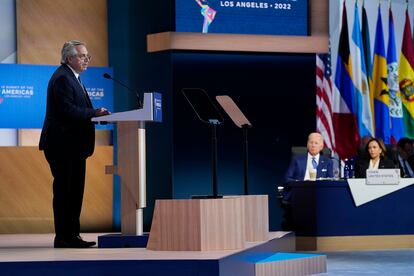Argentina leader to Biden: ‘Being a host does not grant the ability to impose a right of admission’
Alberto Fernández rebuked the US for vetoing countries at the Americas Summit, which was meant to reinforce regional ties but has been dogged by squabbling

The Americas Summit cannot shake the long-running controversy over its guest list. Even though US President Joe Biden has offered a degree of cooperation far beyond that of his predecessor, Donald Trump, he has encountered open criticism over the decision to exclude Cuba, Nicaragua and Venezuela from the gathering. The latest admonishment came from Argentina’s president, Alberto Fernández , the other most prominent figure at the summit’s first plenary session on Thursday. “Being the host country does not grant the ability to impose a right of admission,” he snapped at Biden, who was sitting just a few feet away. The veto has caused the absence of the presidents of Mexico, Bolivia and Honduras.
Fernández’s address was highly critical of the role of the United States in regional politics. After criticizing the sanctions against Cuba and Venezuela, the leader of Argentina asked the Biden government to “open up in a fraternal way” following Donald Trump’s “immensely harmful policy” for the region. “It is time for those policies to change and for the damage to be repaired.”
Fernández also said that the Organization of American States (OAS) has been used “as a gendarme that facilitated a coup in Bolivia,” and that the US has “appropriated” the direction of the Inter-American Development Bank (IDB), which had historically been in Latin American hands. He accused former president Trump of disrupting the rapprochement with Cuba and of intervening with the International Monetary Fund (IMF) to facilitate the unsustainable debt levels of Argentina’s previous administration under the conservative Mauricio Macri, while trying to prevent him, the center-left Fernández, from winning the election in 2019. “The people of Argentina are suffering today because of such indecency.” He asked to reform the OAS, dismiss its directors and to return the IDB to Latin American hands.
Fernández, who has himself been criticized for his lukewarm response to the Russian invasion of Ukraine and his questioning of sanctions, said that “it is urgent to build negotiation scenarios that will end the catastrophe that is war, without any humiliation or desire for domination, without any dehumanized geopolitics or privileges of violence.” He again failed to explicitly condemn the invasion, and instead proposed taxing “the unexpected income that the war gave as a gift to large food, oil and weapons corporations.”
Later, alluding to his diplomatic claim over the Falkland Islands, he stated that Argentina is a peaceful country: “After the tragedy of the pandemic, we see wars as the triumph of human insensitivity,” he said. “President Biden, I am here trying to build bridges and tear down walls.”
Biden sees agreement on essentials
President Biden for his part delivered an optimistic message, noting that “notwithstanding some of the disagreements related to participation, on the substantive matters, what I heard was almost unity” on issues such as migration, healthcare, the environment, financing and economic recovery.
Earlier, in his opening speech for the plenary session, Biden had stressed that his proposals for the region are light years ahead of Trump’s. The US president is offering economic, commercial, food, health and environmental cooperation as a way to promote development and to deal with the migration crisis, for which he will request a shared responsibility this Friday.
Biden used the term “ground-breaking” to describe the Los Angeles Declaration, a document to be signed this Friday, that will create incentives for countries taking in large numbers of migrants and spread responsibility for immigration across the region.
Biden emphasized the need for regional cooperation. “(Over) the next few days, we have an opportunity to find ways we can do better for all of our people by working together – and I emphasize together, together. That’s what our people expect of us. And it’s our duty to show them the power of democracies to deliver when democracies work together.”
Tu suscripción se está usando en otro dispositivo
¿Quieres añadir otro usuario a tu suscripción?
Si continúas leyendo en este dispositivo, no se podrá leer en el otro.
FlechaTu suscripción se está usando en otro dispositivo y solo puedes acceder a EL PAÍS desde un dispositivo a la vez.
Si quieres compartir tu cuenta, cambia tu suscripción a la modalidad Premium, así podrás añadir otro usuario. Cada uno accederá con su propia cuenta de email, lo que os permitirá personalizar vuestra experiencia en EL PAÍS.
¿Tienes una suscripción de empresa? Accede aquí para contratar más cuentas.
En el caso de no saber quién está usando tu cuenta, te recomendamos cambiar tu contraseña aquí.
Si decides continuar compartiendo tu cuenta, este mensaje se mostrará en tu dispositivo y en el de la otra persona que está usando tu cuenta de forma indefinida, afectando a tu experiencia de lectura. Puedes consultar aquí los términos y condiciones de la suscripción digital.








































